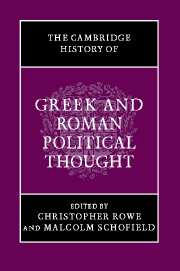Book contents
- Frontmatter
- Introduction
- PART I ARCHAIC AND CLASSICAL GREECE
- PART II THE HELLENISTIC AND ROMAN WORLDS
- 20 Introduction: the Hellenistic and Roman periods
- 21 The Cynics
- 22 Epicurean and Stoic political thought
- 23 Kings and constitutions: Hellenistic theories
- 24 Cicero
- 25 Reflections of Roman political thought in Latin historical writing
- 26 Seneca and Pliny
- 27 Platonism and Pythagoreanism in the early empire
- 28 Josephus
- 29 Stoic writers of the imperial era
- 30 The Jurists
- 31 Christianity
- Epilogue
- Bibliographies
- Index
- Map 1. Greece in the fifth century bc"
- References
21 - The Cynics
from PART II - THE HELLENISTIC AND ROMAN WORLDS
Published online by Cambridge University Press: 28 March 2008
- Frontmatter
- Introduction
- PART I ARCHAIC AND CLASSICAL GREECE
- PART II THE HELLENISTIC AND ROMAN WORLDS
- 20 Introduction: the Hellenistic and Roman periods
- 21 The Cynics
- 22 Epicurean and Stoic political thought
- 23 Kings and constitutions: Hellenistic theories
- 24 Cicero
- 25 Reflections of Roman political thought in Latin historical writing
- 26 Seneca and Pliny
- 27 Platonism and Pythagoreanism in the early empire
- 28 Josephus
- 29 Stoic writers of the imperial era
- 30 The Jurists
- 31 Christianity
- Epilogue
- Bibliographies
- Index
- Map 1. Greece in the fifth century bc"
- References
Summary
Diogenes was a Greek philosopher who lived in a tub; one day he was sunning himself when Alexander the Great, smitten by desire to see the great philosopher, approached and asked if there was anything he could do for him, to which Diogenes responded: ’Get out of my light’.
(Cic. Tusc.v.91; D.L. vi.38)The Cynics had no ideals of their own and assumed the worst of everybody else; hence the modern usages ‘cynic’ and ‘cynical’.
Among non–classicists today these are perhaps the two dominant, although contradictory, images of Cynicism. The first projects Diogenes’ behaviour, which some might regard as merely loutish, as illustrating a truly admirable independence of spirit; indeed, some versions add that Alexander delightedly exclaimed: ‘Had I not been Alexander, I would have wished to be Diogenes’ (Plu. Alex. 14. 5; D.L. VI. 32). The second projects the Cynics as, if not positively immoral, at least unpleasantly amoral. Neither seems to encourage claims that the Cynics made an important contribution to ancient political thought, and the contradiction between the two is but a pale reflection of the many difficulties involved in the attempt to uncover a true picture of Cynicism. Any assessment, therefore, of the Cynic contribution must begin by resolving these difficulties.
- Type
- Chapter
- Information
- The Cambridge History of Greek and Roman Political Thought , pp. 415 - 434Publisher: Cambridge University PressPrint publication year: 2000
References
- 7
- Cited by

